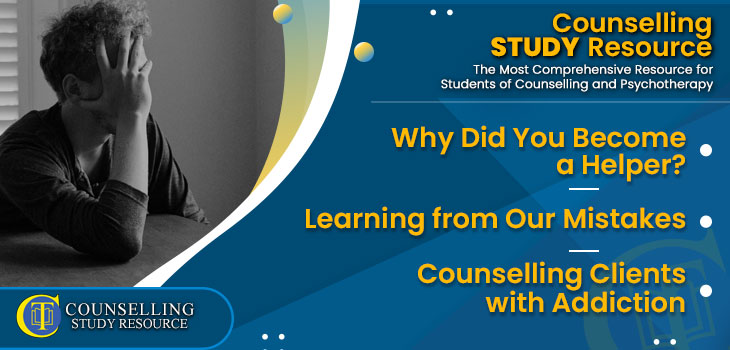218 - Counselling Clients with Addiction
Why Did You Become a Helper? - Learning from Our Mistakes
In Episode 218 of the Counselling Tutor Podcast, Rory Lees-Oakes and Ken Kelly discuss this week’s three topics:
- In ‘Counselling Foundations’, we’ll look at the importance of knowing why you want to work in the service of others.
- Then in ‘Focus on Self’, Rory and Ken discuss learning from our mistakes.
- And lastly in ‘Practice Matters’, Rory speaks with Marion Elkin-Greener about counselling clients with addiction.
Why Did You Become a Helper? [starts at 02:07 mins]
Knowing why you’ve chosen to work in the service of others will help you develop a level of understanding and motivation to do well.
The key points of this section include:
- When you have a strong ‘why’, the ‘how’ you do things will fall into place.
- When it gets hard or lonely, you can look back to your ‘why’.
- Make sure you're in a position to help others – you’re putting yourself in emotional harm's way. You will require emotional robustness.
- Self-evaluation – be honest with, and know yourself fully.
Free handout download on The Skilled Helper is available in the green button above.
Learning from Our Mistakes [starts at 15:33 mins]
Everybody makes mistakes; it’s owning up to them and deciding how to move forwards that matters.
The main factors of this discussion are:
- Reflexivity – reflect, think over your actions and what you can do better in the future.
- Own up to mistakes – this allows you to move past them, most mistakes can often be resolved with an apology.
- Most mistakes are made without malice or intention.
- We’re just human, it’s natural to make mistakes.
Counselling Clients with Addiction [starts at 30:31 mins]
This week, Rory speaks with Marion Elkin-Greener on treating clients suffering from addiction.
The key points include:
- Working with addictions requires extra training, but the core needs don’t change (empathy, positive regard etc.)
- There are differences in how you treat each form of addiction e.g. you will treat an alcohol addiction differently from drug addiction.
- There is slang you’ll have to adapt to and recognise.
- It’s referred to as treatment – goal centered.
- Family therapy – addiction often affects those around the client.
- Relapse will be a part of the recovery process – it’s important the client is aware of this to help prevent feelings of shame and failure.
- Educate clients on other websites etc. that they can go to for additional help and support.
- When counselling clients with addiction, it’s vital to have an open mind and be non-judgemental.
Counsellor CPD members can watch Marion's lecture on working with addictions here.


